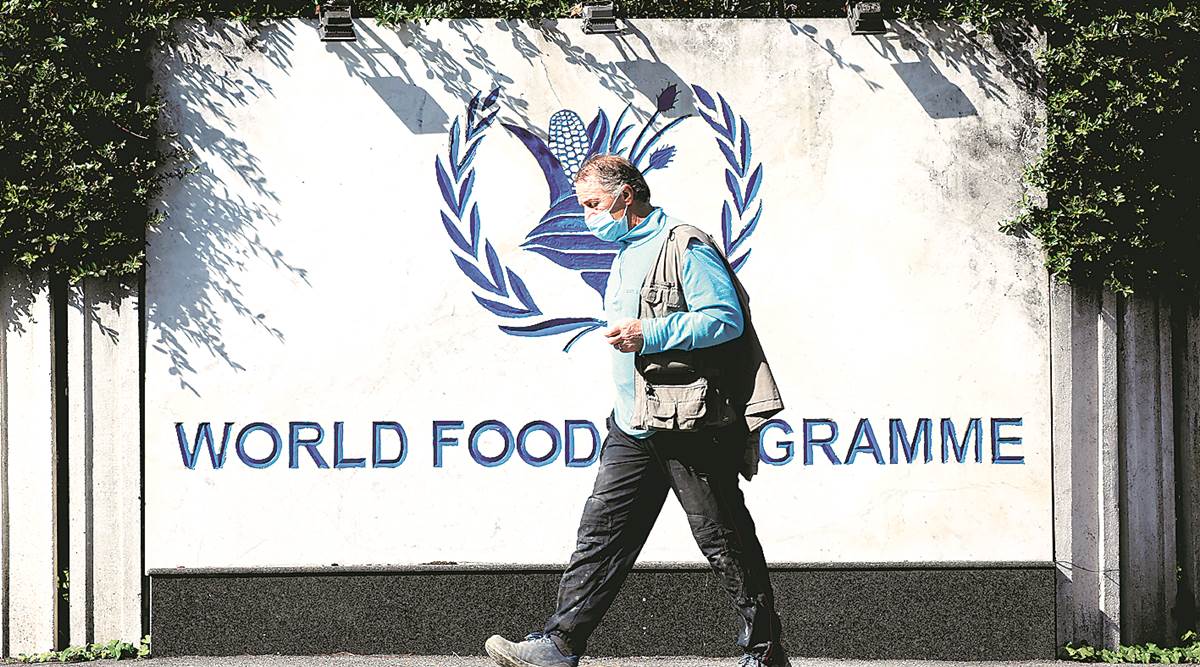 The World Food Programme headquarters in Rome. (Express Photo: Reuters)
The World Food Programme headquarters in Rome. (Express Photo: Reuters)The United Nations’ World Food Programme (WFP), which has been working in India since 1963, at a time when the country was battling food shortages, has been awarded the 2020 Nobel Peace Prize.
The Norwegian Nobel Committee said the WFP, which provides food assistance to millions across the world, had acted “as a driving force in efforts to prevent the use of hunger as a weapon of war and conflict”.
In India, WFP has been working closely with the government, carrying out reforms in the Public Distribution System, besides piloting innovative solutions such as the recent ‘Annapurti’, automatic grain dispensers — ATMs for rice— that are aimed at checking malpractices in the distribution system.
Commenting on the Nobel Peace Prize announcement, WFP Representative and Country Director in India Bishow Parajuli said, “We are deeply humbled… We believe three pillars are central to fixing food system challenges, especially during the Covid-19 pandemic — national social protection systems, basic delivery of food and nutrition through school-based programmes and resilient food systems.”
WFP’s India said that while its focus in the country has been on “transforming the targeted public distribution system”, it is also working on fortification of food distributed under the mid-day meal programme.
According to WFP India, since December 2018, 4,145 metric tonnes of fortified rice has been distributed to 3 lakh school children under a pilot programme in Varanasi.
During the pandemic, WFP India also signed an MoU with the Uttar Pradesh State Rural Livelihood Mission to provide technical assistance for the setting up of supplementary nutrition production units in 18 districts.
Describing WFP’s journey in India as “very good”, Food Secretary Sudhanshu Pandey said, “WFP has been collaborating with the Department of Food and Public Distribution in areas relating to supply chain and rice fortification, and is promoting awareness among beneficiaries on best practices in the food sector.”
“We are also in the process of finalising a memorandum of understanding between the Food Corporation of India and WFP India,” he added.
The Centre has also given an in-principle approval to WPF for a pilot of its Annapurti programme, as part of which automatic grain dispensing machines will be set up at five locations across five states — Uttarakhand, Maharashtra, Karnataka, Uttar Pradesh and Haryana. These machines, expected to check malpractices in PDS distribution, can dispense two commodities at a speed of 25 kg per 1.3 minutes. Each of these dispensers has a built-in storage capacity of 200-500 kg.
According to WFP India, “This solution has become even more relevant during the Covid-19 pandemic, as it allows beneficiaries to avail their entitlements accurately and at a time of the choice, thereby allowing for social distancing with minimal human contact.”
The other initiative, Mobile Storage Units (MSU), a “cost-effective solution for foodgrain storage”, according to the Food Ministry, is running as a pilot in Odisha and Uttarakhand.
📣 The Indian Express is now on Telegram. Click here to join our channel (@indianexpress) and stay updated with the latest headlines
For all the latest India News, download Indian Express App.